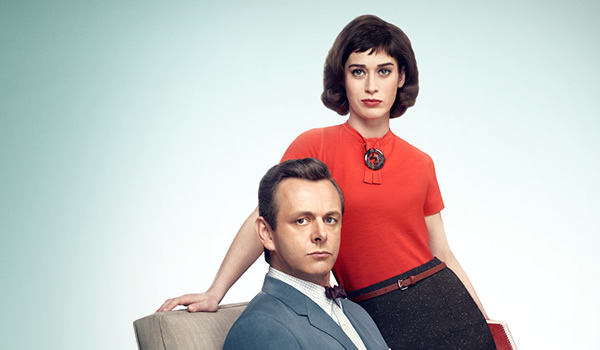It’s said there are few truly original stories in Hollywood.
Like romantic comedy? The formula is simple: boy meets girl, boy loses girl, boy gets girl.
Like a good superhero tale? Get ready for troubled kid (geek, loner, hotshot — the trouble can come in many forms) encountering an exotic event (spider bite, alien ring, etc.), then triumphing not just over a bad guy but also over his own fears and insecurities.
There’s also the underdog sports triumph, harrowing tales of bad teens meeting remorseless killers, inspiring lonely quests against great odds — all stories that are loved or hated based on the quality of the acting, the creativity of the tweaks to the formula, the cinematography, the music, or all of the millions of things that separate good from bad, much-loved from much-mocked in the world of television and movies.
But there is one special story that Hollywood always seems to love: Repressed man or woman rebels, finds sexual freedom, and — like Adam and Eve in the Garden — opens their eyes to a brave new world, except without the Fall.
These stories always hearken back to the horrors of Puritanism, Victorianism, or — gasp — the dark time in America just before the sexual revolution: when abortion, illegitimacy, and divorce all occurred at much lower rates, but Americans apparently suffered the indescribable nightmare of less-satisfying orgasms.
The story arc is familiar — from this dark past steps the always sophisticated, always urbane, sexually liberated hero or heroine. Defying the Sith Lords of prudery, they slowly transform everyone around them into liberated copycats of themselves: better looking, more intelligent, happier, and always so much wittier than the sputtering, frustrated holdouts.
One of the more extreme manifestations of this story is the 1998 film Pleasantville, where the citizens of a black-and-white town of conservative values literally come to life in living color after their own sexual experimentations. Life within the bounds of tradition and morality was gray and dull. Life with good sex? Beautiful and vibrant.
The 2013 version of this tired, cartoonish tale Masters of Sex, Showtime’s new take on sexual revolutionaries William Masters and Virginia Johnson, a researcher and his assistant who became national sexual celebrities for their work on — to use The New Yorker’s phrase — “healthy sexuality.”
In the Showtime version of their rather tawdry story, the high-school-dropout, twice-divorced single mother Virginia Johnson is a veritable intellectual and sexual superhero. She has a way with words and a way with bodies, in direct contrast to her more educated partner, Masters. He’s the dweeb who can’t believe women ever fake orgasms, and has no apparent clue about how to pleasure his wife, but does have a dogged determination to learn more about sex — no matter what the guardians of prudery have to say.
To call Masters of Sex well-reviewed would be an understatement. Slate calls it “the best new show of the Fall season,” while the New York Times, The New Yorker, the San Francisco Chronicle, and the Washington Post have offered similar sentiments. If there’s a media darling this television season, Masters of Sex is it.
But it’s hard to discern why, beyond the reviewers’ love for the underlying theme of sexual rebellion. It’s got the gratuitous sex scenes that pay-cable viewers have grown accustomed to, but one can watch Game of Thrones for that kind of action and still see something that offers a true twist (or two, or three) on a classic genre. Sure, there are snappy one-liners and decent acting, but — again — nothing one can’t see on countless shows in this “golden era” of scripted dramas.
As it is, for the viewer who isn’t tilting at the windmill of 1950s sexual norms, there just isn’t anything original. In fact, the show is so one-note that it has the unmistakable whiff of propaganda, a whiff that critics never fail to point out if they disagree with a show’s message or tone.
In short, Masters of Sex is bad. No, worse than that — it’s boring.
It’s a boring show with a tragic ending. Don’t tell the writers, of course. To them, the story ends with liberation, with the defeat of the patriarchy, and with great sex for everybody.
But for millions in the real world, the story ends with grief, heartbreak, and a baby-momma sitting at home with three kids by two baby-daddies, with one late on child support and the other occasionally abusive. It ends with a bankrupt nation struggling to support an underclass whose salient characteristic is the very liberation from the stifling bonds of family that Masters of Sex so repetitively skewers.
And in that bankrupt, heartbroken real world, what do the intellectual and moral heirs of Masters and Johnson have to say to those baby-mommas at home? Cheer up. You could have a husband, an intact home, and a life untainted by the agony and guilt of abortion, but — hey — in the bad old days the orgasms were faked.
So, watch Masters of Sex, but only if you want to watch Hollywood’s favorite story, told Hollywood’s favorite way, with nothing at all original to add.
— David French is a lawyer, writer, and veteran of the Iraq War. This article first appeared here on National Review.










